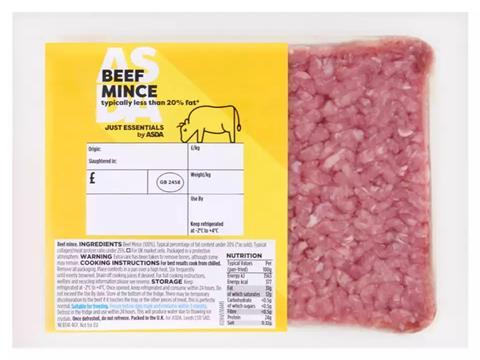
Asda is replacing the traditional tray packaging for its Just Essentials beef mince range with a lighter, recyclable plastic film said to contain 60% less plastic – a move hoped to save over 60 tonnes of plastic every year.
Vacuum-packing the mince removes the oxygen from inside the pack, which reportedly extends the product’s shelf life. It also downsizes the pack and takes up less space in storage without cutting down on the amount of beef mince in the pack.
The film is designed to be recyclable in line with OPRL guidelines and can be returned to Asda’s in-store collection points for recycling.
As a result of this transition, 67.6 tonnes of plastic are expected to be removed from Asda’s supply chain every year. It also contributes towards the retailer’s goal of ensuring that 100% of its packaging is recyclable by 2025.
Just Essentials beef mince packaged in the new film is now available to buy in store and online.
“We’re always looking at new ways that we can make positive changes which will benefit both our customers and the planet, and we believe that this is one of those changes,” said John Wells, sustainable packaging manager at Asda. “Not only does this improve shelf life and provide greater convenience for our customers, it also removes tonnes of non-recyclable plastic from our supply chain, reducing our carbon footprint.”
Similar developments came to light last year, with Lidl aspiring to reduce an annual 250 tonnes of plastic by vacuum-packing its beef mince range and Tesco trialling a new ‘pillow pack’ in place of the tray packaging for its beef mince range, hoping to reduce its own plastic use by 70%.
Before them both, Sainsbury’s sought to reduce 55% of plastic per beef mince product with its own vacuum packs – yet the decision was widely criticised by consumers, who felt that the new packaging spoiled the quality of the meat and was less recyclable than its predecessor.
If you liked this article, you might also enjoy:
The Lidl approach to packaging sustainability
How did Brazil achieve its 100% aluminium can recycling rate – and can it be replicated in the EU?
Experts have their say on the EU’s Packaging and Packaging Waste Directive revisions
A deep dive into the most important packaging sustainability trends and solutions














No comments yet